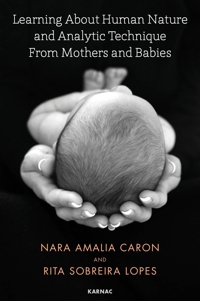Learning About Human Nature and Analytic Technique from Mothers and Babies

Book Details
- Publisher : Routledge
- Published : 2017
- Cover : Paperback
- Pages : 282
- Category :
Child and Adolescent Studies - Catalogue No : 38902
- ISBN 13 : 9781782204848
- ISBN 10 : 1782204849
Reviews and Endorsements
‘This book enables us to learn what is happening to parents when they conceive a child and what happens to babies so dependent on their parents for compassionate comprehension, nurturance, love, and encouragement. Nara Amália Caron and Rita Sobreira Lopes are internationally renowned for their precise, deep, and poetic exposition of infantile states of mind. These six narratives of infants observed from the time of their conception until three years of age reaffirm the authors’ capacity to sensitively describe the complexity of human encounters between the infant and the mother and father. This book is crucially important
for parents and mental health professionals, for it brings refreshing new insights regarding the unique personality of each baby in the womb as well as revealing how actively the baby both influences and is influenced by the relationship with the parents. Convincing observations and commentaries enable clinicians to fine-tune their ability to observe and comprehend primitive psychic phenomena presented by people in the consulting room.’
- Dr Jeanne Magagna, child, adult, and family psychotherapist, formerly Head of Psychotherapy Services at Great Ormond Street Hospital for Children, editor of The Silent Child: Communication without Words, and co-editor of Intimate Transformations: Babies with their Families
‘This book is essential reading for everyone interested in infant observation and its applications. Nara Amália Caron and Rita Sobreira Lopes are passionate about observation and its use in research in all kinds of places. These include ultrasound examinations with parents-to-be and their extended families, in the delivery room itself, and with babies who are not going to survive. In all settings, they are struck anew by the observers’ painful, direct, primitive experience of what babies feel. Their training of and support for their observer-researchers takes them back to the originator of infant observation, Esther Bick, for whom, along with Donald Winnicott they have profound respect and gratitude. The authors’ knowledge, particularly of places where “verbalisation has no meaning” has inspired many future analytic practitioners and observer-researchers, and their devotion to discussing and publishing their findings is an inspiring gift to us all.’
- Trudy Klauber, editor of Infant Observation: The International Journal of Infant Observation and its Applications

